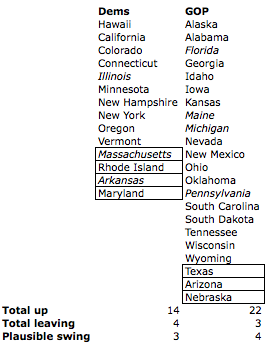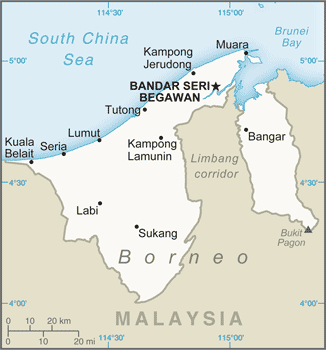Topics: Nigeria; Michael Sam and Jason Collins. People: Bill, Nate, Greg, and guest historian Pilar Quezzaire.
Podcast: Play in new window | Download
Subscribe: RSS
Topics: Nigeria; Michael Sam and Jason Collins. People: Bill, Nate, Greg, and guest historian Pilar Quezzaire.
Podcast: Play in new window | Download
Subscribe: RSS
 Unfortunate news out of North Carolina today as a Democratic Congressional candidate passed away unexpectedly after an accident. He was locked in a close primary race with former Idol runner-up Clay Aiken.
Unfortunate news out of North Carolina today as a Democratic Congressional candidate passed away unexpectedly after an accident. He was locked in a close primary race with former Idol runner-up Clay Aiken.
North Carolina Democratic congressional candidate Keith Crisco was found dead at his home on Monday, days after his primary race against singer Clay Aiken was declared too close to call. Crisco was 71.
The Asheboro Courier-Tribune reported that, according to employees at his company, Asheboro Elastics, emergency workers found Crisco after he suffered injuries related to a fall in the residence.
Crisco, who served as the state’s Secretary of Commerce from 2008 to 2012, reportedly trailed Aiken by 369 votes following their May 6 primary election.
Here is my analysis on the district and Aiken’s chances in the general election from February:
Clay Aiken, American Idol season 2 runner-up and a very successful singer, of Raleigh, North Carolina is throwing his hat into the political ring as a Democrat in North Carolina’s 2nd Congressional District. A lot of the articles I’ve seen have either failed to provide any context whatsoever or have written him off completely without much detail. So, I aim to remedy that here.
[…]
In terms of the big picture for the U.S. House, Democrats would probably love to recapture that district, which — before it was redrawn — had once been historically black and was only lost to Ellmers in 2010 by fewer than 2,000 votes. Barack Obama won the old district in 2008 (but would have lost it heavily to McCain under the new lines).
That being said, the NC 2nd is a district that was drastically redrawn by the Republican legislature after 2010, to be a low-income and heavily white district with a 50-50 urban rural split. It has a 10 point Republican voter lean in the 2013 Cook PVI ratings, though it may be that those Republicans are more solid than the previous version of the district, since it was actually slightly more Republican on paper when it was held by Democratic Bob Rep. Etheridge. In the 2012 presidential election, it voted for Mitt Romney by 18 points.
So, it will be an uphill battle for any Democrat there, even without considering that it would be a midterm race (lower turnout) and that Aiken is openly gay in a state that just voted in 2012 to ban any legal recognition of same-sex relationships. Ellmers, while unpopular nationally as a person (her shutdown comments are the tip of an unpleasant iceberg), is a solid conservative in a new district that voted to re-elect her last time by a margin of over 45,000 votes or 15 points. But it’s probably worth noting that Mitt Romney outperformed her in the same election when her Democratic opponent in 2012 didn’t have much name recognition, which may demonstrate some vulnerability. Even so, it’s still a decisive result that will made it a challenge for any Democrat — even for someone like Aiken who could probably assemble a reasonably credible campaign.
There are a huge number of races for governor up for election this year (which is true of any midterm year since most states adopted four-year terms aligned with the non-presidential cycle). 36 states — almost three-quarters of the states — will be electing or re-electing governors in November of this year, as you can see on the map below:
That’s a lot to take in. All of New England, most of the Mountain West and the Plains States, and so on. 36 states are on the board, and Republicans won a lot of them in the 2010 wave, which puts them in a good position overall, given the power of incumbency. But how do we analyze the state of the races more logically and clearly?
In the chart below, I’ve broken it down in an easy-to-read list form, with the states listed in either the Democratic or Republican column, based on current occupant (there are currently no independents in the state governorships). There are boxes around the retiring or term-limited current governors.

In that graphic, I’ve also put in italics the states that are most likely to be within reach. It’s not exhaustive, of course, just the likeliest. I based that determination — since I confess to being unable to keep up with all 36 races closely — on a) incumbent favorability from a year ago in the last Fivethirtyeight analysis I could find on the governors, and b) whether the voters have a solid preference for one party or the other in the governorship of their state.
In other words:
It’s a bit subjective and un-statistical, but it’s a good way to break down the problem when there are 36 races to analyze and too much data to crunch without being Fivethirtyeight or the like.
Using that assessment system, I concluded that there is a relatively narrow set of races that are fairly likely to be competitive come November.
Democrats’ biggest vulnerabilities — in my eyes — are Illinois, Massachusetts, and Arkansas. Let’s take those one at a time.
Republicans’ biggest vulnerabilities — in my eyes — are Florida, Maine, Michigan and Pennsylvania. And now let’s take those one at a time:
So there are about seven seats to watch right now. It might expand to 10 or drop to 5 as we get closer to November. My guess is that Republicans will lose a few of these seats — which isn’t surprising given how many they are defending — but will retain an overall edge and even pick up at least a couple. That basically means it’s probably going to be roughly a wash overall, without changing much nationally. I think that may be echoed in many of the other contests this year: Republicans will end up in about the same position they were when they started, but still ahead by a bit.
 Secretary of State John Kerry and the Obama Administration are now (justifiably, I’d say, at this point) taking huge heat for trying to cement a major alliance with the podunk Southeast Asian absolute monarchy of Brunei.
Secretary of State John Kerry and the Obama Administration are now (justifiably, I’d say, at this point) taking huge heat for trying to cement a major alliance with the podunk Southeast Asian absolute monarchy of Brunei.
President Obama himself had been scheduled to travel to Brunei last fall during the trip to Indonesia, which the government shutdown canceled. Last year, he called the Sultan “a key leader in the Southeast Asia region and also widely respected around the world.”
Outrage has been stirred up with the long-planned launch in April by the government of a phased rollout for an elaborate new penal code with extreme religious conservatism based in hardline Sharia Law interpretations. In particular, U.S. LGBT activists in California are furious over the draconian anti-gay provisions and have been organizing boycotts against local Brunei state investments.
But the anti-gay problem is just the tip of the horrible, no good, very bad legal iceberg for the monarchy with fewer residents than Boston. At least a fifth of the country’s population is non-Muslim, which is now punishable with death by flogging. Interfaith marriages are now adultery, punishable with death by stoning. Breaking the laws of Brunei while outside the country (i.e. in neighboring Malaysia, also located on the island of Borneo) is also to be punishable under Brunei rules.
So why has the U.S. State Department been trying so enthusiastically to secure a partnership with the Sultanate of Brunei and its ironically named Abode of Peace?
Because it’s got a ton of natural gas and oil relative to its size (35th biggest oil exporter and 26th biggest gas exporter in the world), it’s an original member of the proposed Trans-Pacific Partnership free trade agreement, it’s strategically located on the South China Sea coast, it’s been a counterterrorism partner since 2001 … and I guess they weren’t expecting it to go way off the deep end suddenly like this.
But really, I think the warning signs should have been there. Generous oil-funded social welfare policies aside, Brunei has not been cool people for quite some time now. Their human rights abuses, near total lack of civil rights, and obvious authoritarianism were pretty well known before now. The former British protectorate and past regional sea empire has been ruled by one dynasty with a pretty ironclad fist for six centuries.
Some of the pretend constitution’s provisions have been ignored for so long by the monarchy that the country hadn’t even gained independence (1984) at the time they were suspended formally, in the 1960s. The safe money would have been on further regression, not a dramatic improvement, for all the signs the world has been picking up from Brunei in the past decade.
One of those signs? According to the Boston Globe, it should have been the 2013 global human rights report from… drumroll please… the U.S. State Department:
…the State Department’s 2013 global human rights report criticized Brunei for its restrictions on religious freedom; exploitation of foreign workers; and limitations of the freedom of the press, assembly, and association as “the most prevalent human rights problems.”
It went on to mention the adoption of the new legal code based on religious Sharia law but noted that “the effect of the law will not be clear until it is implemented, which was scheduled to begin in phases starting in April 2014.”
Nobody could have predicted…
But it seems that finishing a free trade deal with such a pivotal player was too much to pass up. It’s interesting that nearly 600 years after Brunei rose to power by controlling water trade and coastal ports in the dense commercial shipping zone not far from the Spice Islands, it’s leveraging the exact same strategic economic power to do whatever it wants. I guess it’s true what they say!
Cliven Bundy, anti-government rancher and political theorist extraordinaire, has been releasing videos with even more information on his extremely “unique” view of American — and indeed Western — history and the American social contract. Buzzfeed collected some of the “best of” made-up facts from Bundy’s video.
My favorite is:
They [the Pilgrims] had a central government, which was Europe. Was the strongest army in the world. And they ruled with unlimited power. And there was a point that they decided they wasn’t going to live that way any more. And so they had a revolution.
This and others are so amazingly off-base I’m not sure I could have intentionally made up alternative history this great as a joke. (Long-time readers may recall my extensive alt-history-based satire, before this site or SBBS existed.)
To recap: This man — who is trying to argue based on an arcane and incorrect legal theory that the Federal government can’t make him pay to graze cattle on Federally-managed public lands — literally believes the 1620 Pilgrims had a revolution (in 1776? — unclear) and flat-earth-sailed to America, because they needed to escape a totalitarian government that ruled over all of Europe with a massive army. And somehow, despite a total lack of knowledge on the country’s actual history to the point of not knowing facts the rest of us learned in elementary school, he is a “patriot.”
Somewhere in the afterlife, Oliver Cromwell (England’s real-life dictator from 1653-1658, long after the Pilgrims had left and long before King George III reigned) is silently weeping at the thought of how much phenomenal power he would have had in the 17th century Bundiverse.
I’ve said it before but: Thailand keeps reminding me a lot of U.S. politics these days…
The opposition party leaders orchestrated protests for almost half a year specifically demanding that Prime Minister Yingluck Shinawatra be removed — supposedly because she was a front operation for her brother, the former Prime Minister Thaksin Shinawatra, who was himself removed by a military coup in 2006. Supposedly, these were sincere protests all about the two of them.
But the same week she was forced by the courts to resign on flimsy charges, they immediately start protesting for the removal of caretaker Prime Minister Fill-in-the-Blank. Basically didn’t even matter who it was.
As we’ve known all along the protest leaders were full of it. Their street members had always made clear to the media that this was never about the Shinawatras personally and was always about the fact they stay losing fair elections since 1992.
When you keep losing elections, it must be the democracy that’s broken, rather than your own mind-blowingly out-of-touch lack of mass appeal outside your own immediate base.
Maybe the opposition should stop constantly mocking, belittling, and denigrating the voters who make up 70% of the electorate and then saying the votes must have been bought because a majority of the voters won’t vote for you. Just a thought.
Oh well, time to remove the next poor fellow and continue blocking anyone from voting in new elections. People who don’t vote for conservatives who “know best” don’t deserve to vote anyway! It’s a privilege, not a right! And if conservatives don’t win every time (or, in Thailand’s case, ever), then no one should be allowed to vote at all.
You stay bitter, Bangkok.
France’s defense minister has just announced plans to create a semi-permanent force of 4,000 troops across the entire Sahel and Sahara in former French West Africa, as it redeploys most of its troops in Mali.
“There will be 1,000 soldiers that remain in Mali, and 3,000 in the Sahel-Sahara zone, the danger zone, the zone of all types of smuggling,” Mr Le Drian said, in a television interview.
“We will stay as long as necessary. There is no fixed date,” he added.
French forces will be based in four regional centres – Mali, Chad, Niger and Burkina Faso – Reuters news agency reports.
Smaller bases from which to launch strikes are being set up, with Ivory Coast as the mission’s logistical hub, it adds.
I find this development fairly troubling. France should too. Open-ended commitments are rarely a good idea.
However, it’s also not surprising, given the increasing re-involvement of France in the security affairs of its former African colonies in the past decade. A small, permanent force in several locations in or near the Sahel/Sahara is probably the only way (from a feasibility standpoint) that France can both avoid permanent and ineffective occupations (at much higher cost in lives and money) and respond quickly to rising threats, kidnappings, etc., which it feels it must do for its own security.
All the same, this open-ended, rapid-reaction wack-a-mole approach to counterterrorism — where they keep thousands of troops all over West Africa (and Central African Republic nearby) before periodically bursting into neighboring countries for a minute, guns blazing, like Operation Neptune Spear — makes France seem more than a bit neo-colonial.
 It also seems like an easy step down the path toward becoming completely mired in an unwinnable, transnational counterinsurgency operation in the Sahel — something others have warned against previously often.
It also seems like an easy step down the path toward becoming completely mired in an unwinnable, transnational counterinsurgency operation in the Sahel — something others have warned against previously often.
As ever, the Sahel needs more of a Marshall Plan development aid strategy than troop deployments.